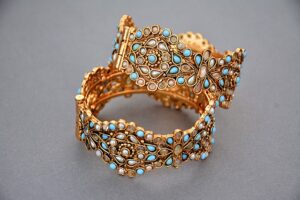The Timeless Importance of Jewellery in Indian Culture
India, a land rich in culture and tradition, has always had a deep connection with jewellery. From ancient times to the modern era, jewellery in India has been more than just an accessory; it is an expression of heritage, social status, and spirituality. This post explores the multifaceted importance of jewellery in Indian culture, touching on its historical significance, symbolic meanings, and its role in modern society.
1. Historical Significance of Jewellery in India
Jewellery has been an integral part of Indian culture for over 5,000 years. The Indus Valley Civilization, one of the world’s oldest, shows evidence of advanced jewellery-making skills, with craftsmen creating intricate pieces from gold, silver, and precious stones. These early pieces were not just ornaments but symbols of power, wealth, and divine protection.
During the Mughal era, jewellery reached new heights in craftsmanship. The Mughal emperors were known for their love of opulent jewellery, often studded with emeralds, rubies, and diamonds. This period also saw the blending of Persian and Indian styles, giving birth to unique designs that continue to inspire modern jewellery.
2. Symbolic Meaning of Jewellery in Indian Traditions
In India, jewellery holds deep symbolic meanings. Each piece worn during various life events, such as weddings, religious ceremonies, and festivals, carries significant cultural and spiritual connotations.
- Weddings: Indian weddings are incomplete without elaborate jewellery. The bride is adorned with pieces that symbolize purity, prosperity, and the union of two souls. The mangalsutra, a sacred necklace, signifies marital commitment and is considered a talisman for the husband’s long life.
- Religious Significance: Jewellery is often used in religious rituals. Gold, in particular, is associated with the goddess Lakshmi, the deity of wealth and prosperity. Temples across India are adorned with gold and precious stones, signifying the divine connection between wealth and spirituality.
- Cultural Identity: Different regions of India have distinct jewellery traditions. For instance, Kundan and Polki jewellery from Rajasthan, temple jewellery from South India, and the elegant pearls of Hyderabad each represent the rich cultural diversity of India. Wearing these traditional pieces is a way to honor one’s heritage.
3. Jewellery as a Status Symbol
In India, jewellery has long been a marker of social status. Owning elaborate and expensive jewellery is often a sign of wealth and social standing. Historically, the amount and quality of jewellery a person possessed were directly linked to their social rank.
Even today, jewellery continues to be a significant investment. Gold, in particular, is seen as a secure and valuable asset. Many Indian families pass down heirloom jewellery through generations, which not only carries financial value but also emotional and cultural significance.
4. The Role of Jewellery in Modern India
In contemporary India, while the traditional significance of jewellery remains intact, its role has evolved. Today, jewellery is as much about fashion and personal style as it is about tradition and symbolism. Modern designs often blend traditional elements with contemporary aesthetics, catering to a generation that values both heritage and individuality.
Jewellery is also a significant industry in India, contributing to the economy and providing employment to millions. The country’s skilled artisans continue to uphold the legacy of exquisite craftsmanship, ensuring that Indian jewellery remains sought after both domestically and internationally.
5. Conclusion The importance of jewellery in India is deeply rooted in its history, culture, and religion. Whether it is a bride’s wedding necklace, a temple’s gold ornaments, or a modern-day fashion statement, jewellery in India is much more than an accessory—it is a reflection of the country’s rich cultural tapestry. As trends evolve, the significance of jewellery in Indian society continues to adapt, preserving its timeless appeal for future generations.



